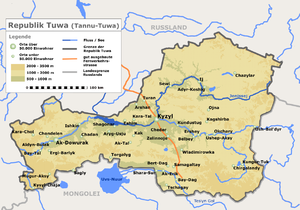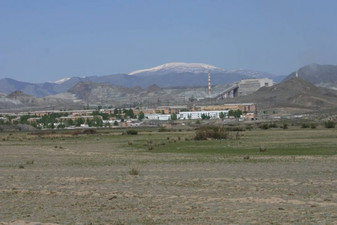The Autonomous Republic Tuva (Тува) is in the Russian Federation Siberia. It is limited by the republics Khakassia and Altai in the west as well Buryatia in the East. In the north is the region Krasnoyarsk, in the south is the Mongolia.
| location | |
 | |
| flag | |
 | |
| Short dates | |
| Capital | Kyzyl |
|---|---|
| Form of government | Autonomous Republic |
| currency | Russian ruble (RUR) |
| surface | 168,604 km² |
| population | 307,930 inhabitants |
| languages | Tuvinian, Russian |
| Religions | Buddhist, Shamanistic, Russian Orthodox |
| power grid | 220 V / 50 Hz |
| Phone code | (7) 394xx |
| Internet TLD | .ru, .asia |
| Time zone | UTC 8 |
Regions

Tuwa is divided into 17 Koschuune, there are also 2 city districts.
places


Ak-Dovurak

Kyzyl
Schagonar
Other goals
background
For centuries, the area of the Republic of Tuva belonged to the Chinese Empire and there, together with the current state of Mongolia, to "Outer Mongolia". In the turmoil of the slowly disintegrating Qing dynasty, a separatist movement proclaimed the independent Republic of Tuva in 1912. De facto, however, this state was always a satellite state of the Russian tsarist empire or later the Soviet Union, which had no unauthorized political leeway. In 1944, the Tuva Republic was also formally incorporated into the Soviet Union.
The republic is also considered to be extremely isolated due to the lack of traffic routes and sees relatively few tourists. In addition to the untouched nature, the republic offers an independent, Asian-influenced culture that cannot be found anywhere else in this form.
language
Along with Russian, Tuvinian is the official language in the republic. It is widespread, with ethnic Tuvins predominantly using it as their everyday language. Most Tuvins understand Russian, especially in the capital Kyzyl, but do not necessarily speak it perfectly. Only a few Tuvinians speak English, some also understand some German, for example former soldiers who were stationed in the GDR. Tuvinian is a Turkic language, it is written with Cyrillic letters.
getting there
Tuwa is fairly isolated from neighboring regions by high mountain ranges, so that there is no train connection within the country and into the country as yet. Flights from Moscow to Kyzyl are only available once a week (as of August 2013). The best way to enter the country is therefore to go to Abakan to travel and continue from there to Tuva.
The train ride from Moscow to Abakan takes 76 hours and costs around 4,000-10,000 rubles, flights depart from Moscow-Sheremetyevo and last 5 hours. In front of the airport in Abakan there is a parking lot with a marshrutka (shared taxi) that takes travelers to Kyzyl. The trip costs around 1500 rubles per person (make sure to agree the price in advance) and takes around 5 hours (400km). There is a stop on the way where you can eat and drink something. The bus ride from Abakan to Kyzyl is a little cheaper, but it also takes longer. The route leads through the Sajan Mountains and offers some beautiful landscapes.
mobility
There are practically two major roads in Tuva - one from north to south and one from east to west. On these roads you can get around quite well by car or bus, although the asphalt surface is not always completely even. Some regions of Tuwas can only be reached via unpaved roads, here you can only get through with four-wheel drive, or even only by boat or helicopter.
Buses from Kyzyl to the other regions start at the central bus station (approx. 50 m from the Hotel Mongulek). You have to inquire about departure times. There is a parking lot directly in front of the Hotel Mongulek, where the marshrutkas start. The drivers wait until the car is full, depending on the travel destination this can take a while. If you don't have that much time or patience, you can buy all the seats and the trip starts immediately - but then it's less interesting because you don't get to talk to the residents.
Tourist Attractions

- National Museum, in Kyzyl.
- Monument "Center of Asia", on the banks of the Yenisei in Kyzyl.
- Buddhist monastery, in Chadan.
- Settlements of Old Believers in East Tuva and in the Choda region.
- Ruins of the Uighur fortress, in Kungur-Tug. Accessible only by helicopter.
- Azas lake, in Choda. Accessible by jeep or helicopter.
- Holy springs (arshani) all over the country, they are said to have healing powers when bathed in them.
activities
- Attending wrestling matches: two men compete against each other, whoever hits the ground first has lost.
- Watch horse and camel races
- Tuwa is famous for larynx and overtone singing. A very deep tone is produced and a second tone (overtone) is placed over it. You can listen to concerts or take a few hours of lessons yourself (inquire at the Tuvinian Cultural Center in Kyzyl; cost per hour: 1000 rubles).
- Paddling or white water rafting on the Yenisei
- For the very brave: swimming in the (ice-cold) Yenisei
- let the shamans summon the spirits
kitchen
Tuwas cuisine is typically Central Asian - there is a lot of meat and many dairy products. Restaurants are rare, but in the larger settlements you can usually get plow (rice with meat and a few carrot strips), bliny (plins) or pelmeni (cooked dumplings filled with meat). A specialty is cedar kernels, which are nibbled fresh or roasted. They are rarely found in shops, but can be found in markets or on the side of the road, where people drink chan-chai (salted milk tea), kumys (fermented mare's milk), beer (usually offered in two-liter bottles) or vodka. Wine is very rare and coffee is almost always made from instant coffee powder.
nightlife
In Kyzyl there are a few small bars and clubs that are located at the hotels. Elsewhere, people go to a nearby river for a chat in the evening and look at the stars. The local kiosks are also meeting points, but alcohol is only allowed to be sold until 7 p.m. One shouldn't believe too much signs with opening times at restaurants and cafés, the actual opening times often differ considerably.
security
You should prepare for extreme climates, especially in winter you need suitable clothing to protect yourself against the cold. It is helpful, whenever possible, to use local sources of information to be warned of floods, forest fires, etc. There are forbidden areas that you should avoid as much as possible.
Nature is very pristine and represents a danger for the inexperienced. If you are in the forest, you should watch out for snakes, which usually warm up in the sun on the stones. There aren't many of them, but some could be venomous vipers. The other problem these (and other regions of the Northern Hemisphere) have is ticks. Your bites may be infectious, vaccinations are recommended.
One should never stray further from human settlements without the appropriate equipment and leave the path, destination and intended period of the hike or rafting tour behind with every tour.
climate
The climate is continental - very hot summers, very cold winters. Overall, very little rainfall and lots of sunshine.
literature
- Anett C. Oelschlägel: The white way. Natural religion and divination among the western Tyva in southern Siberia. Leipzig University Press, Leipzig 2004, ISBN 3-937209-52-2 .
- Anett C. Oelschlägel: The taiga spirit. Reports and stories from people and spirits from Tuva. Contemporary sagas and other folklore texts. Tectum-Verlag, Marburg 2013, ISBN 978-3-8288-3134-6 .
- Anett C. Oelschlägel: Plural world interpretations. The example of the Tyva of South Siberia. SEC Publications, Fürstenberg / Havel 2013, ISBN 978-3-942883-13-9 .
- Sewjan Weinshtein: Mysterious Tuva. Alouette Publishing House







